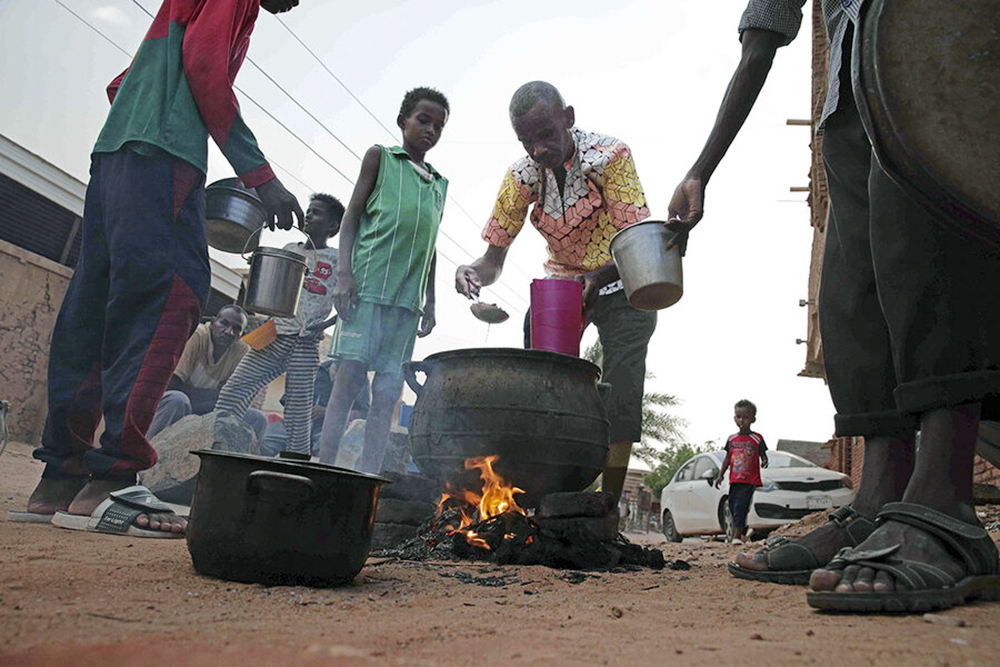
April War Aftermath: Over 25 Million Sudanese in Need of Humanitarian Aid
Abdulrahman Al-Ajeb
As the destructive April war enters its eighth month, conditions in Sudan continue to deteriorate rapidly. The suffering of citizens in all aspects of life is escalating at an alarming pace, potentially reaching a catastrophic level. The Under-Secretary-General for Humanitarian Affairs and Emergency Relief Coordinator (Martin Griffiths) stated in a mid-October release that over 9,000 people have lost their lives due to the war. Additionally, 25 million individuals are in need of assistance. Griffiths emphasized that civilians in the states of Khartoum, Darfur, and Kordofan have not experienced relief from bloodshed and terrorism for six months.
According to Griffiths, the humanitarian response plan has only received 33% of the total 2.6 billion required for aid delivery. He explained that humanitarian actors have been unable to reach accessible areas due to funding shortages.
Seven states directly impacted by the ongoing war between the army and the Rapid Support Forces since April 15 are Khartoum, North Kordofan, West Kordofan, and the four Darfur states (North, South, West, and Central Darfur). Additionally, South Kordofan and Blue Nile are witnessing conflicts between the Sudanese army and the Sudan Peoples Liberation Movement led by Abdulaziz Adam Al-Hilu.
Nine out of Sudans 18 states, which have not been directly affected by the war, namely Gezira, Nile River, Northern, Red Sea, Kassala, Al-Qadarif, White Nile, Sennar, and East Darfur, have experienced large-scale displacement from conflict-affected areas. The suffering of citizens in these states has intensified due to infrastructure weaknesses and halted production caused by the war.
The destructive April war has led to the destruction of infrastructure, including healthcare centers, with 70% of them going out of service in conflict areas, including Khartoum, Darfur, and Kordofan. Despite a severe shortage of medicines, equipment, and staff, the healthcare system in safe areas is striving to continue providing medical services amid rising cases of cholera, watery diarrhea, malaria, and fevers.
In late October, the United Nations Office for the Coordination of Humanitarian Affairs (OCHA) reported an estimated 3.1 million Sudanese at risk of cholera and watery diarrhea. The Sudanese Ministry of Health confirmed 1,618 suspected cholera cases, including 67 deaths, in 22 localities spanning Khartoum, Al-Qadarif, Gezira, and South Kordofan. OCHA updated that over 3.1 million people are at risk of acute watery diarrhea and cholera in eight states from July to the end of the year.
The Sudanese Ministry of Health requested technical support from the World Health Organization, seeking 2,521,785 doses of oral cholera vaccines. The international drug group approved 1,576,448 doses for cholera vaccination in several localities.
In late October, the Ministry of Health revealed the spread of cholera and dengue fever in 10 states, putting immense pressure on a healthcare system on the verge of collapse. The ministry reported 1,059 people infected with acute watery diarrhea/cholera in Al-Qadarif, Khartoum, Gezira, and South Kordofan, with 73 deaths. Dengue fever spread across nine states, affecting 3,316 individuals, with 4,088 suspected cases. The United Nations anticipated 3.1 million cases of diarrhea and cholera in eight out of 18 Sudanese states from July to the end of the year.
UNICEF urged conflict parties and the world to pay attention to the plight of millions of Sudanese children and families. The organization called for increased commitment from the international community and all conflict parties to address the crisis. UNICEF received reports of over 3,100 serious violations, including child killings and mutilation, expressing concern about the escalating child rights violations amid intensified fighting in recent weeks.
Statistics indicate that the war has forced 5.9 million Sudanese, including three million children, to flee their homes, with most internally displaced and hundreds of thousands seeking refuge in neighboring countries. UNICEF emphasized that children bear the brunt of violence, with 14 million children in need of life-saving assistance. Many live in constant fear of being killed, injured, or used by armed groups.
UNICEF stated that no Sudanese child will be able to return to school, jeopardizing the future of an entire generation. The organization highlighted that 19 million children are unable to return to classrooms, making it one of the worlds worst educational crises. UNICEF pointed out that children are at risk of deadly diseases such as cholera, dengue fever, measles, and malaria, which are on the rise, and 7.4 million Sudanese children lack access to safe drinking water, making them more susceptible to cholera and diarrhea


